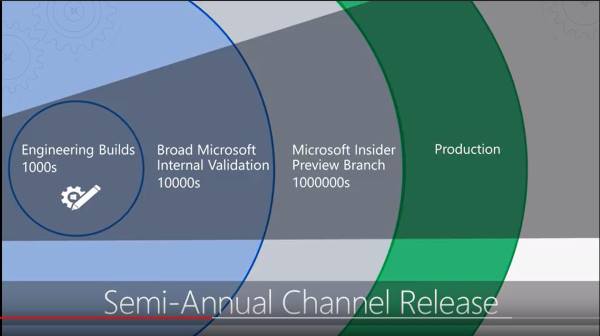Originally posted by Weasel
View Post
 It is not totally with 'no changes' there too, as sometimes changes happen to be required, but at least they are as least intrusive as possible and so on.
It is not totally with 'no changes' there too, as sometimes changes happen to be required, but at least they are as least intrusive as possible and so on.
Originally posted by F.Ultra
View Post
https://docs.microsoft.com/en-us/win.../waas-overview
Basically they have 3 base channels too - Windows Insider, Semi-Annual and LTSC (there is also something called Quality channel, from LTS POV but that just like optional upgrading from one Debian Stable release to next Stable release)
 Not quite the same but that is very similar so something like Debian Testing, Ubuntu non-LTS and Debian Stable and further LTS/ELTS... CIP
Not quite the same but that is very similar so something like Debian Testing, Ubuntu non-LTS and Debian Stable and further LTS/ELTS... CIP 
As you can see they also have something called 'Engineering Builds 1000s'
 and that is rolling actually like Debian Unstable or even Experimental
and that is rolling actually like Debian Unstable or even Experimental  Further you see 'Internal Validation' that is like Debian Testing, then goes 'Preview Branch' that is like Ubuntu-non LTS beta or Debian next stable alpha/beta whatever and 'Production' is like Ubuntu non-LTS or like others semi-annual linuxes, Fedora/openSUSE or such...
Further you see 'Internal Validation' that is like Debian Testing, then goes 'Preview Branch' that is like Ubuntu-non LTS beta or Debian next stable alpha/beta whatever and 'Production' is like Ubuntu non-LTS or like others semi-annual linuxes, Fedora/openSUSE or such...Debian Stable and Ubuntu LTS are none of that, but in a way we could say "Annual Production & Long Term Channels" if we prefer to use Microsoft's vocabular

Now of course debianxfce can't understand all this as he prefer to run 'Custom Engineering Builds 1000s' and to troll along the way how everything else is crap


 ... so where they could upgrade in 2-3 years, that is recommended and default also for Debian Stable or Ubuntu LTS users anyway. I think this is something Microsoft calls LTSC+Quality users
... so where they could upgrade in 2-3 years, that is recommended and default also for Debian Stable or Ubuntu LTS users anyway. I think this is something Microsoft calls LTSC+Quality users 

 . I've seen them migrating slowly to containers so I guess that some one have sold them the idea that with containers you can safely version lock everything and thus never ever have to upgrade anything.
. I've seen them migrating slowly to containers so I guess that some one have sold them the idea that with containers you can safely version lock everything and thus never ever have to upgrade anything.
Comment